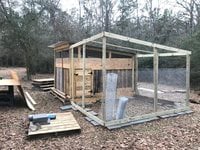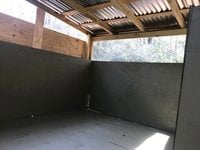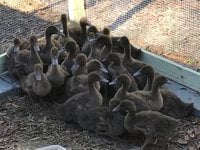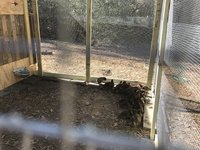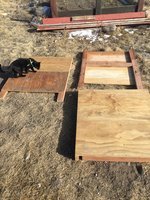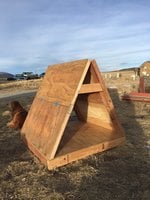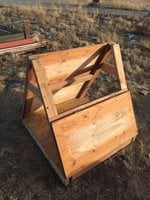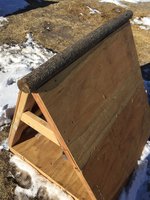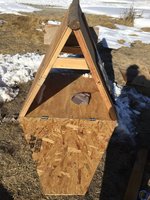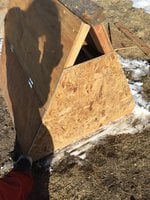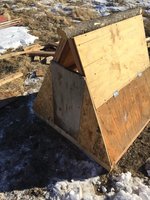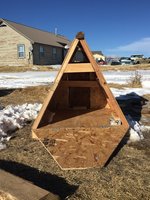- Jul 10, 2015
- 683
- 676
- 292
Types of housing
Ducks don't care about housing in any shape or form. Frankly, every duck in the world would prefer to be completely free 24/7. And I think, the closer you can get to this ideal, the better. All they NEED is something that keeps them safe from predators, provides relief from the extremes, and is hygienic and healthy for them.
Mobile pens are nice in small areas and for providing constant fresh grass, but their space is so limited. Ducks clearly prefer large spaces over smaller ones, even when the space is supposedly enough for them (10 sq. ft. or whatever). Freedom gives them so much more opportunity express their personality. Even though my mobile pens (which now they only spend the night in) are big enough for all the ducks, by typical size standards, they act like they're dying to get out as soon as sunrise breaks.
Permanent coops with permanent runs are okay, but I think it's better to have at least two permanent runs to rotate between, because they will eventually destroy all the grass. It needs time to recover.
Personally, I like permanent coops for the night and free-ranging for the day by far the best, but I know that won't work for many people.
If predators aren't a problem, it doesn't get extremely cold, and you aren't hatching ducklings, I think a simple yard would be fine, with no coop (since ducks just don't like coops), so long as they have shade and preferably somewhere that's always dry, even in rain. People usually say ducks need somewhere dry and draft-free to sleep, and I agree that would be best, but currently our flock does fantastic in a mobile pen with no solid roof (only chicken wire) and no floor. Some nights are wet and windy. I don't know whether they mind or not. It's not that cold here, so the drafts aren't a big problem, or at least they don't seem to be. I do have something better in mind for the future though. If nothing else, I hate muddy eggs, and our main pen isn't adequate for ducklings. (There is a roof and floor for part of our other pen, so it's okay for ducklings so long as they have a mother to protect them from drafts and any rain coming in the side.)
There are other options, but I think those are the main ones. Although tomorrow I'll probably remember something major I missed.
How much room
For the night, ducks need more room than chickens, because they are more active during the night and don't roost. Three to four square feet per bird is usually considered the minimum, depending on the breed size. I never go with less than 5 square feet per bird, although if I had bantams I'd be fine with 4 square feet. Outside, the more, the better. It can't be too big. But at least 10 square feet. My ducks free range on a six-acre property, but they use only about two acres of it (33 ducks and four geese).
Nest boxes
They don't mind sharing nest boxes one bit. How many depends on the breed, I think. For Muscovies, who only lay about 100 eggs a year, I would have approximately one nest box per six ducks, but the number is flexible. What ducks do mind (at least the breeds that like to go broody) is privacy. I actually wrote a post about how to encourage ducks to lay in nest boxes and prevent them from hiding their eggs here: http://www.raising-ducks.com/hidden-nest/
What they need in the coop
Nest boxes, of course, unless you don't mind them scattering their eggs wherever. I always provide water. Some people don't. To prevent your bedding from getting wet, use waterers with a small lip so they don't have room to splash or dunk their head (they can have that outisde). And, if you can, put the waterer over a wire frame so the spilled water will fall through the frame rather than soaking the bedding. You could feed them inside as well, but I prefer not to. Besides that, and bedding, they really don't need much.
Oh, but the coop does need excellent ventilation. The more, the better.
Temperatures
Ducks can withstand temperatures of up to 0 F, at least. I know one flock raiser who keeps them outside 24/7, and when it gets below 0 F, she puts them in their coop, which is not heated, but has plenty of ventilation and no drafts. Heating often causes more harm than good, so unless you live in a REALLY frigid area, I recommend going without it.
It sometimes gets to 110 F where I live. The ducks certainly get hot, but they've never had issues with heatstroke or anything. (Muscovies originated in Central America, so they're quite well adapted to very hot temperatures.) They spend the day either bathing in the shade or panting under our house. It's actually cooler under the house than in the house.
OK, I think that's it for now. There's tons more that could be said on the subject of housing, but I'm ready for bed and you're probably ready to quit reading.
Ducks don't care about housing in any shape or form. Frankly, every duck in the world would prefer to be completely free 24/7. And I think, the closer you can get to this ideal, the better. All they NEED is something that keeps them safe from predators, provides relief from the extremes, and is hygienic and healthy for them.
Mobile pens are nice in small areas and for providing constant fresh grass, but their space is so limited. Ducks clearly prefer large spaces over smaller ones, even when the space is supposedly enough for them (10 sq. ft. or whatever). Freedom gives them so much more opportunity express their personality. Even though my mobile pens (which now they only spend the night in) are big enough for all the ducks, by typical size standards, they act like they're dying to get out as soon as sunrise breaks.
Permanent coops with permanent runs are okay, but I think it's better to have at least two permanent runs to rotate between, because they will eventually destroy all the grass. It needs time to recover.
Personally, I like permanent coops for the night and free-ranging for the day by far the best, but I know that won't work for many people.
If predators aren't a problem, it doesn't get extremely cold, and you aren't hatching ducklings, I think a simple yard would be fine, with no coop (since ducks just don't like coops), so long as they have shade and preferably somewhere that's always dry, even in rain. People usually say ducks need somewhere dry and draft-free to sleep, and I agree that would be best, but currently our flock does fantastic in a mobile pen with no solid roof (only chicken wire) and no floor. Some nights are wet and windy. I don't know whether they mind or not. It's not that cold here, so the drafts aren't a big problem, or at least they don't seem to be. I do have something better in mind for the future though. If nothing else, I hate muddy eggs, and our main pen isn't adequate for ducklings. (There is a roof and floor for part of our other pen, so it's okay for ducklings so long as they have a mother to protect them from drafts and any rain coming in the side.)
There are other options, but I think those are the main ones. Although tomorrow I'll probably remember something major I missed.
How much room
For the night, ducks need more room than chickens, because they are more active during the night and don't roost. Three to four square feet per bird is usually considered the minimum, depending on the breed size. I never go with less than 5 square feet per bird, although if I had bantams I'd be fine with 4 square feet. Outside, the more, the better. It can't be too big. But at least 10 square feet. My ducks free range on a six-acre property, but they use only about two acres of it (33 ducks and four geese).
Nest boxes
They don't mind sharing nest boxes one bit. How many depends on the breed, I think. For Muscovies, who only lay about 100 eggs a year, I would have approximately one nest box per six ducks, but the number is flexible. What ducks do mind (at least the breeds that like to go broody) is privacy. I actually wrote a post about how to encourage ducks to lay in nest boxes and prevent them from hiding their eggs here: http://www.raising-ducks.com/hidden-nest/
What they need in the coop
Nest boxes, of course, unless you don't mind them scattering their eggs wherever. I always provide water. Some people don't. To prevent your bedding from getting wet, use waterers with a small lip so they don't have room to splash or dunk their head (they can have that outisde). And, if you can, put the waterer over a wire frame so the spilled water will fall through the frame rather than soaking the bedding. You could feed them inside as well, but I prefer not to. Besides that, and bedding, they really don't need much.
Oh, but the coop does need excellent ventilation. The more, the better.
Temperatures
Ducks can withstand temperatures of up to 0 F, at least. I know one flock raiser who keeps them outside 24/7, and when it gets below 0 F, she puts them in their coop, which is not heated, but has plenty of ventilation and no drafts. Heating often causes more harm than good, so unless you live in a REALLY frigid area, I recommend going without it.
It sometimes gets to 110 F where I live. The ducks certainly get hot, but they've never had issues with heatstroke or anything. (Muscovies originated in Central America, so they're quite well adapted to very hot temperatures.) They spend the day either bathing in the shade or panting under our house. It's actually cooler under the house than in the house.
OK, I think that's it for now. There's tons more that could be said on the subject of housing, but I'm ready for bed and you're probably ready to quit reading.

